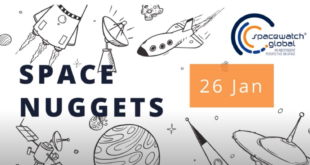
Le Gall gave a presentation during the plenary session on ‘The Space Climate Observatory: a Green New Deal’, in which he outlined the genesis of this initiative. CNES has engaged the efforts of the world’s space agencies to step up their cooperation and actions in the field of climate change, to address its impacts and monitor ecosystems in order to inform decisions at global and local scales. This commitment led to the adoption of the Paris Declaration creating the Space Climate Observatory (SCO), signed by the space agencies of Europe, China, India, Israel, Russia, Mexico, Morocco and the United Arab Emirates, as well as by UNOOSA, UNDP and the European Commission. President Macron also recently reaffirmed the importance of tackling climate change and the European Union is advocating a Green Deal to transform Europe’s economy and gear it towards sustainable development.
The SCO’s ultimate goal is to deliver data, information, models and tools to inform decisions on coping with the impacts of climate change. It will provide products and indicators at the appropriate territorial scale, working in coordinated fashion with space agencies and large international organizations alongside existing major international climate programmes. Operating downstream of these international programmes, the SCO aims to help nations prepare for climate change, build realistic scenarios and monitor the impacts being felt locally now and in the future. This ability for nations to specifically analyse the consequences of global changes at the scale of territories and populations will enable them to devise more effective coping and mitigation solutions.
Concluding his address, Le Gall said: “Only analyses and views from space give us the information we need to propose climate-resilience actions to decision-makers at world, national, regional and local levels. Such actions will be made possible by combining our data with in-situ analyses and local data, and will enhance our ability to explain climate change, to convince people that it is real and to spawn a new planet-wide awareness. We have before us one of the biggest challenges ever faced by humankind—not to go to the Moon or Mars, not to venture ever deeper into our Universe, but to preserve our planet for future generations. With the SCO, CNES is ready for this Green New Deal.”





